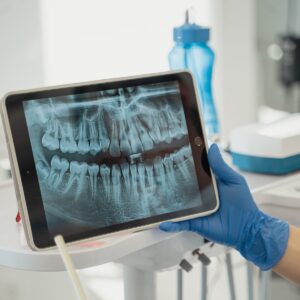Wisdom teeth, also known as third molars, are the last to emerge in the oral cavity. While some individuals have no issues with their wisdom teeth, many experience problems that necessitate removal.
This article aims to provide an informative and precise overview of Bradenton, FL’s wisdom teeth removal process. The content will cover common issues associated with wisdom teeth, signs and symptoms of problems, the actual removal procedure, recovery tips, and aftercare.
Additionally, guidance will be offered on choosing the right dentist for wisdom teeth removal. With an objective and impersonal approach, this article addresses an audience seeking knowledge and understanding of wisdom teeth removal while presenting the information professionally and academically.

Common Issues with Wisdom Teeth
One common issue with wisdom teeth is impaction, where the teeth cannot fully emerge from the gums, often causing pain and discomfort. Impacted wisdom teeth occur when there is insufficient space in the jaw for the teeth to grow correctly. This can result in the teeth becoming trapped beneath the gum line or growing at an angle, pressing against neighboring teeth.
Complications can arise if impacted wisdom teeth are not addressed promptly. These can include the development of cysts, infection, and damage to surrounding teeth and bone. Additionally, impacted wisdom teeth can lead to overcrowding, misalignment, and bite problems.
To prevent these complications, it is often recommended to remove impacted wisdom teeth, especially if they are causing pain or if there is evidence of potential issues.
Signs and Symptoms of Wisdom Teeth Problems
Indications and indications of problems related to the third molars can include:
- Redness and swelling of the gums
- Pain or discomfort in the back of the mouth
- Difficulty opening the mouth fully
- A persistent bad taste or odor
When wisdom teeth do not have enough space to emerge properly, they can become impacted. This means they cannot break through the gum line fully and can cause several complications. Impacted wisdom teeth can lead to:
- Infection
- Cysts
- Damage to adjacent teeth
The pressure from impacted teeth can also cause pain and discomfort in the jaw, head, and neck.
Recognizing these signs and symptoms of wisdom teeth problems is essential to address them promptly and prevent further complications. Consulting with a dental professional is recommended to determine if wisdom teeth removal is necessary.
The Wisdom Teeth Removal Procedure
The procedure for removing wisdom teeth involves a surgical extraction performed by a dental professional to alleviate symptoms and prevent further complications.
Before the surgery, the dentist will conduct a thorough examination, including X-rays, to determine the position of the wisdom teeth and assess any potential risks or complications.
A local anesthetic is administered to numb the area around the tooth, and in some cases, sedation may be used to ensure the patient’s comfort.
The dentist then makes an incision in the gum tissue to expose the tooth and may need to remove any bone-blocking access.
The tooth is then carefully extracted; if necessary, the dentist may need to stitch the incision to promote healing.
Following the procedure, the patient will be given aftercare instructions to minimize discomfort and reduce the risk of infection or other complications.
Patients must follow these instructions closely and attend necessary follow-up appointments to ensure proper healing.
Recovery Tips and Aftercare
To promote optimal healing and minimize the risk of complications, it is crucial for patients to carefully follow the aftercare instructions provided by their dental professional following the wisdom teeth extraction procedure. Recovery time after wisdom teeth removal can vary depending on the individual but typically takes about a week.
Patients may experience discomfort, swelling, and difficulty opening their mouths fully during this time. Over-the-counter pain medications such as ibuprofen or acetaminophen may be recommended to manage pain. Applying ice packs to the affected area can also help reduce swelling.
It is important to avoid strenuous activities or exercise for at least 24 hours after the procedure to prevent excessive bleeding. Patients should also stick to a soft diet for the first few days and avoid using straws or smoking, as these can dislodge blood clots and delay healing.
By following these recovery tips and aftercare instructions, patients can ensure a smooth healing process after wisdom teeth removal.
Choosing the Right Dentist for Wisdom Teeth Removal
When considering the extraction of impacted third molars, patients should carefully select a qualified dentist with experience in oral surgery to ensure a safe and successful outcome.
The dentist’s qualifications are crucial in the wisdom teeth removal process. Patients should look for dentists who have completed specialized training in oral surgery and have a thorough understanding of the anatomy of the oral cavity.
It is also essential to consider the cost of the procedure when choosing a dentist. Patients should inquire about the overall cost of wisdom teeth removal, including any additional anesthesia or post-operative care fees. It is advisable to obtain multiple quotes from different dentists to compare prices and ensure that the chosen dentist offers fair and competitive pricing.
Choosing a reputable and experienced dentist for wisdom teeth removal is essential to ensure optimal outcomes. By considering the dentist’s qualifications and the procedure’s cost, patients can make an informed decision and have confidence in their choice of dentist for wisdom teeth removal.
